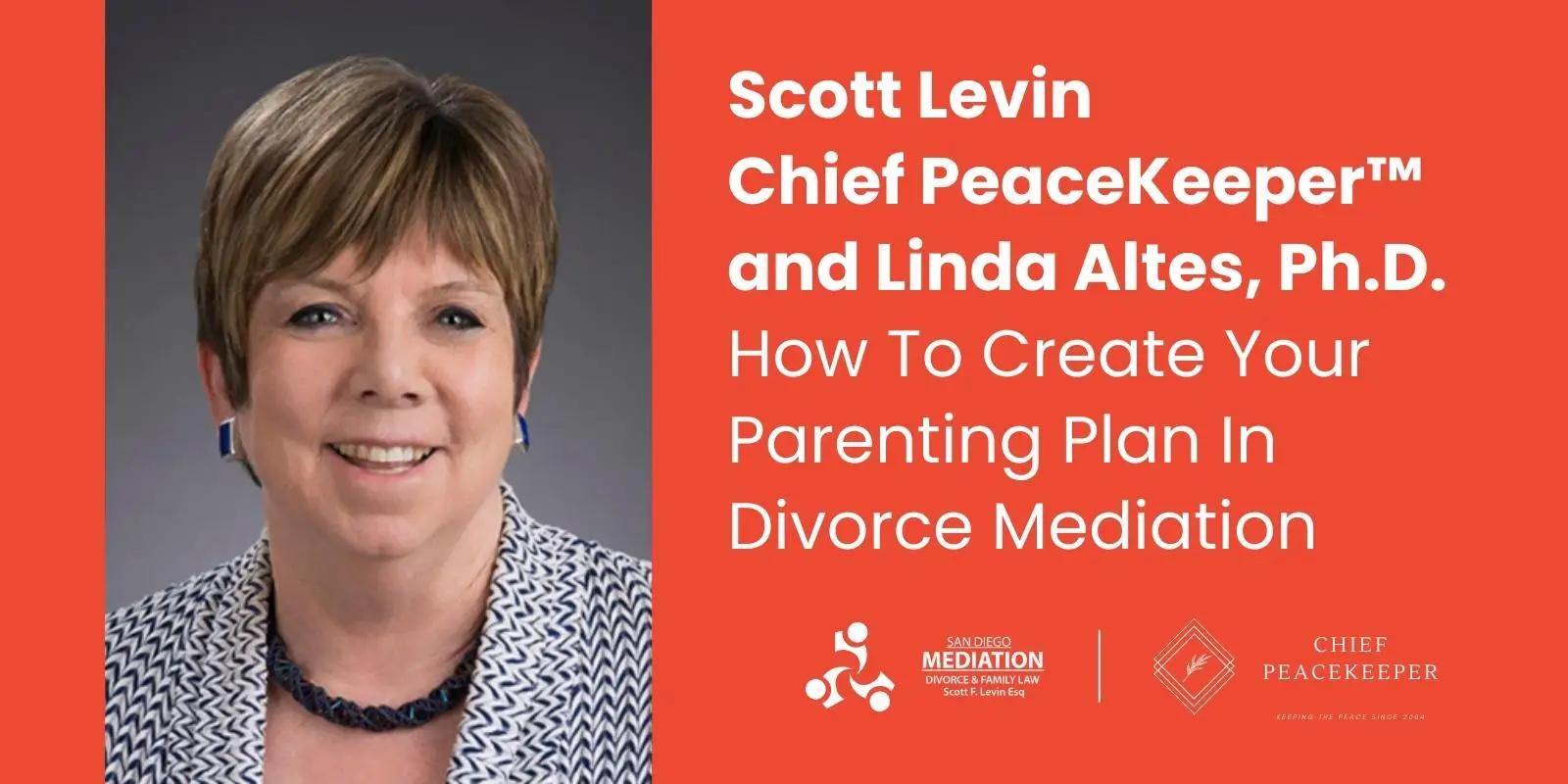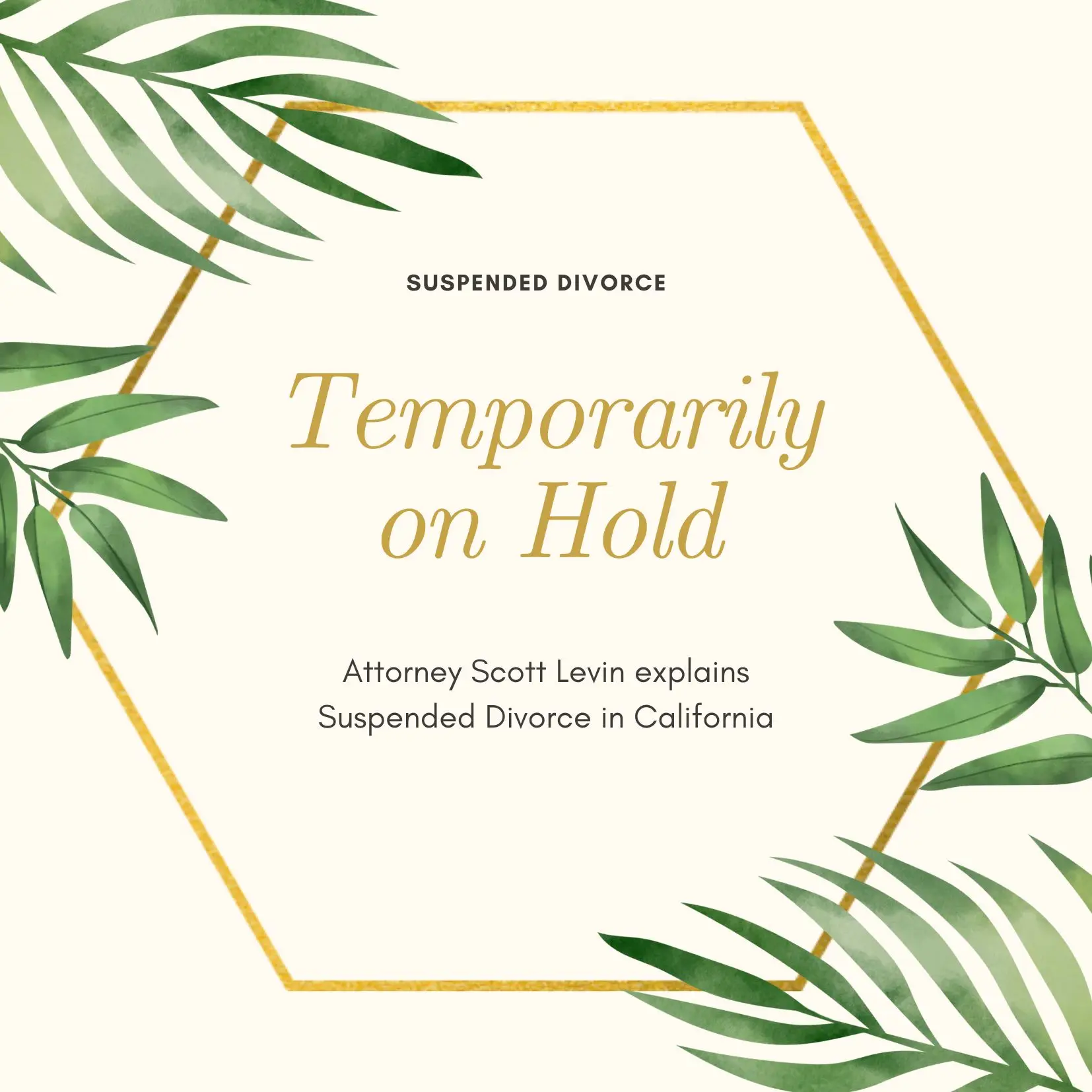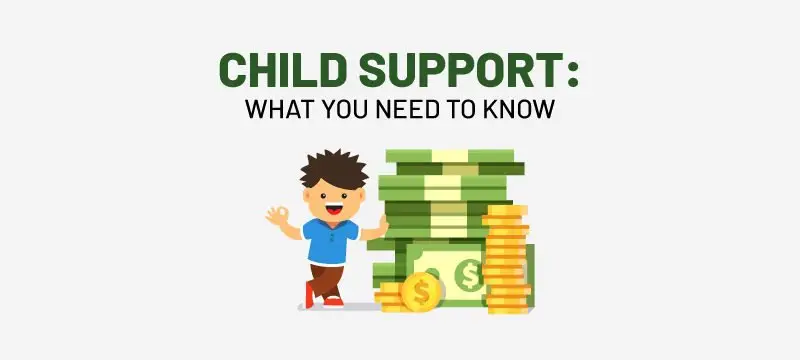Scott Levin, Chief Peacekeeper™ with San Diego Divorce Mediation & Family Law sits down to discuss parenting plans and custody with Linda A. Altes, Ph.D.
Chief PeaceKeeper™ Scott Levin 0:02
Hi everybody. My name is Scott Levin and I am the founding partner at San Diego Divorce Mediation and family law, and I am a professional peacekeeper and mediator, and today we are blessed to have Dr. Linda altos Ph.D. with us. Hi. Hi, Dr. alters. Hello, I turned 11 Hi, Dr. altos is a licensed psychologist in San Diego. She has worked with families going through divorce since 2000. And she has the most incredible reputation. As we both live in San Diego. She’s really an incredible resource. She is the former president of the San Diego Psychological Association, along with many other accolades, and she has given us a few minutes today to talk in-depth about parenting plans. Now parenting plans for people going through divorce and post-divorce. It’s it’s a huge part of the process. It’s also possibly the most emotional part of the process. So there’s a lot of feelings. And there’s a lot of issues with regard to parenting plans. And I thought that having Dr. Altis talk us through some of these issues, and really focusing on the health and well-being of the children would be a valuable few minutes for all of us. So thank you again, Dr. Altis. And in terms of parenting plans, if you don’t mind that if we start, what does the research tell us about how to how to best structure these plans for the betterment of children?
Linda Altes 1:39
Well, thank you for asking that question. And thank you for inviting me to do this interview. Because I really do want to share the information and the research we have about parenting plans. All parents really wanted what’s best for their children, and need to know that our research very, very strongly supports children having regular ongoing contact with each parent as the most important factor. So we want children to be seeing each parent on a regular basis. There’s no one really right parenting plan, which we’ll get into in a minute. But we want to have that as a goal to maintain regular ongoing contact. The other strong research that we have is that children’s adjustment to divorce and post-divorce is directly related to the parent’s level of conflict. So when parents are able to interact civilly support the children’s relationship with the other parent, the children actually do quite well. No, that that said, we know and you have certainly seen every parent, every couple, going through a divorce has some level of disagreement, conflict, disappointment with each other. And that is pretty typical. But what we do is we ask the parents to protect their children from that conflict. Do not get into disputes, disagreements, at exchanges, when you’re exchanging the children, don’t let the children overhear your telephone calls. That’s one of the reasons I really love mediation, because it gives the parents a forum to work out their conflicts and disagreements, and learn how to better communicate with each other, which is critical for the children’s adjustment, frankly. Yes, so
Chief PeaceKeeper™ Scott Levin 4:03
knowing that the goals of continual and ongoing contact and the minimization of tension and openness and the openness of conflict between co-parents what can you tell us about particular parenting plans that help accomplish those goals? And if you don’t mind sharing some examples that you often recommend, that would be wonderful.
Linda Altes 4:32
You know, many parents come to me and want to know what is the very best parenting plan? What should they do? And we don’t have a one size fits all kind of solution. Whatever parenting plan you come up with needs to work with the parent’s schedules, and the children’s schedule. Now, we do live in what’s called a 5050 state. Our goal is to have You know about equal parenting time for each parent. But interestingly, our research doesn’t show that 5050 parenting time is any better than 6040 parenting plan. Remember, our goal is regular ongoing contact with each parent. And once the parenting time drops below, say, roughly a third of the time, it’s just hard to have enough contact to know what’s happening in your child’s life on a day-to-day ongoing basis. So one of the plans that we see is, it sounds complicated is actually it’s more straightforward than it sounds is a five, two to five plan. And what this means is that the children are with one parent every Monday, Tuesday with the other parent every Wednesday, Thursday, and then the parents alternate weekends. And the way you get that five is that during one week, the children are with one parent. Wednesday, Thursday, Friday, Saturday, Sunday, the next weekend, the next week there with the other parent, Friday, Saturday, Sunday, Monday, Tuesday. Now one of the reasons I like this plan is you, the children and the parents know where the children will be on any day. So the children get a sense of Oh, this is a day with my mom or with my dad, parents are able to schedule doctor’s appointments, dentist appointments and know where the children will be on that day. So it’s an easy way to remember the schedule, which I think is important. The other schedule that we see sometimes is 3443. And there are many variations of this plan that I always have to look up because I can’t remember it. And I worry about this plan. Because if I can’t remember it, how does an eight-year-old remember where they are, which week, one of the simplest ways to do a 3443 schedule is to split the weekends? And this actually works for many families. You know, we don’t always have to have every other weekend. Some parents clearly like to travel or go camping go out of town. But other families say you know, we’re just here on the weekend. And I would love to have one weekend day every week. So you can do this, this type of it is another type of 5050 plan where one parent has the children every Sunday, Monday, Tuesday, the other parent has the children every Thursday, Friday, Saturday, and you can alternate weekends. And I’m sorry, alternate Wednesdays not weekends. And that is a 5050 split if actually one parent always has that Wednesday because of work schedule or other considerations. It’s a 6040 split. So they both work. You can look it up online. Another way to do this is 3443, which I said I can never remember, and see what works for your family. Because more important, it’s more important to have a schedule that actually works for the parents and the children, than to have some model that it’s sort of standard in the community. So
Chief PeaceKeeper™ Scott Levin 8:59
yeah, I agree. And if one of the parents wants to go out of town with the kids on the 3443 for the weekend, I think that you know, plans can be temporarily altered, and days can be traded through open communication between the parents.
Linda Altes 9:20
Absolutely. That is the sort of keystone of every successful parenting plan, to have the flexibility and to be able to make changes depending on what’s going on in the family. So you can actually put that into your parenting plan. If you have this split weekend, that every month or two each parent can request a full weekend and the children will get to have a full weekend with each parent. Now the other thing is that things come up unexpectedly. parents get sick. That’s one thing we’re all thinking about right now, and might be a good time to have the children just go to the other parent. Well, one parent is ill sometimes now it used to happen in the past, not so much now, but it will happen again, extended family members visit. And we want the children always to be able to see their extended family members. And so all plans, I think that work well. I have good communication, the ability to be flexible, the ability to trade days or times. Those are sort of a hallmark of successful plans out, you know, there’s 150 50 plan that we didn’t talk about, actually, cuz I don’t like it so much. But parents often come up with Well, let’s just do a week on week off, that seems pretty straightforward. And the reason I’m not a big fan of that plan is that it’s a long time for children to go without seeing one of their parents. And it’s also a long time for parents to go without seeing their children. Now, that said, I do think a week on week off, plans work with teenagers, sometimes who have a whole many, many books to transport sports equipment, music equipment, and the moving back and forth between homes just gets cumbersome. Now teenagers have a better sense of time, they are better able to stay in touch with their parents than younger elementary school children. So I do think that sometimes it’s a workable model for families with teenage children.
Chief PeaceKeeper™ Scott Levin 12:00
Yeah, no, I think that was incredibly, incredibly valuable information. And let me just briefly put a plug in for the benefits of mediation in terms of the flexibility, because parents post-divorce are going to have to communicate with each other in a way that’s respectful and to the point, but they’re going to have to trade days and things will come up, you cannot 100% of the time on or just your days, things will come up vacations, other things that we’re going to talk about in a moment sickness. And through mediation. co-parents learn how to discuss and communicate. And the alternative of litigation is that you know, what I often tell people is that your lawyers aren’t going to be there in four years when you are post-divorce and in need of communicating with your, with your former spouse, about your kids and the parenting plan. So I think it’s really important that people learn that can meet those communication skills during the mediation process, which affords them that opportunity. In terms of younger kids, let me ask you, kids that are not yet elementary school age, are there you different considerations for those younger kids then, and what do those plans change in light of the in light of that younger age?
Linda Altes 13:30
Absolutely. Thank you for bringing that up. younger children have very special needs. And we have special parenting plans that address the needs of infants, toddlers, preschool children, we do not expect these very young children to be able to manage a 5050 split as we can do with elementary school-aged children. I think it’s a topic that is probably addressed at another time. But overall, we’re looking at a step-up plan where which will gradually move into a more equal parenting time for each parent. And we’re also very focused on the developmental needs of the child. And you know, with toddlers and infants and preschoolers, that is quite variable. So these plan parenting plans for younger children under five need to be very, very carefully crafted. Also, I think they require an incredible amount of flexibility and communication between the parents. This is obviously best handled through mediation because these children Just have very special needs. They’re moving quickly through developmental stages. And it requires a great deal of communication between the parents.
Chief PeaceKeeper™ Scott Levin 15:14
Yeah, no, no doubt and it and it requires the parents to be focused on the health and well-being of their kids first, which is sometimes difficult for people. Because it sometimes means that they’ll see those younger kids a little bit less than they would like to. And I think that that’s an important point you’ve made. So thank you. In terms of another aspect of parenting plans that is, can be hotly contested at times, that I’d like to talk briefly about our holidays, vacations, special occasions, family traditions, tell us a little bit about the ideal way that that those sort of days and events can be split, and how you prefer to set those up?
Linda Altes 16:08
Well, you know, this is actually very hard for every family. Because we’re talking about holidays, special occasions, parents’ birthdays, children’s birthdays, and everybody wants to be with their children on holidays and special occasions. And so there are different ways of approaching this. You can share the holiday, you can split it so that the children see each parent on the holiday or their birthday, you can alternate them. So this year, you have Thanksgiving, next year, I have Thanksgiving, or you can trade them. Sometimes we see families where one parent loves Halloween, and the other parent loves the Fourth of July. And so you can just say okay, every year, you get the Fourth of July, and I get Halloween. When we’re looking at holiday and special occasion times and school breaks, we look at what have the family traditions, Ben, because we want to keep those intact as much as possible. If the family has a tradition, every spring break, we go visit your family every Thanksgiving week we visit my family, we kind of if the children are used to that pattern, we’d like to keep that going. So holidays are also times we look at the extended family and how to incorporate them into the children’s lives. It’s also though a time to create new traditions. Because the holidays won’t be the way they were if we’re splitting them, trading them alternating them. So it is a time for parents to come up with new traditions that they can start with their children and with their extended family.
Chief PeaceKeeper™ Scott Levin 18:12
Yeah, that’s you know, really great points. Let me tell you, I mean, the big topic on everyone’s mind, especially within California, schools will start closed and with distance learning. I am working from home. I never worked from home before. So I loved getting out to the office. But I’m working from home 90% of the time. So and my wife’s frontline worker, so so she is out of their home. So we’ve enlarged, you know, kind of reversed roles. To a great extent do you think if so, how do you think that COVID-19 is affecting, you know, the parenting plans and the ideal signups of those plans?
Linda Altes 19:02
You know this is putting a tremendous strain on families. And as you know, it is very hard to work from home, while parenting your children. I mean, it’s just difficult. And so what I’m seeing is an increased need for communication, support, cooperation. I’m seeing parents talk with each other about I have an important meeting on this day. Can you watch the children and he got this obligation Can you cover for me? And it really, I think that children benefit and the parents are able to support each other cooperate, communicate, be flexible, not worry about percentages at this time. Let’s just get our work covered our children cared for entry About how we’re going to do this. And recognizing that these are very, very challenging different difficult times. It’s really a tremendous strain on families and a time when I think we really all have to step up and help each other out to parent the children and to get our work done. Yeah.
Chief PeaceKeeper™ Scott Levin 20:28
I think that’s incredible advice. And I think everyone listening today understands now why Dr. altos is a leader in this industry. She is someone that I rely on for my clients and so many others do. Just a true and unbelievable resource for anyone in California that is in need of her expertise. Dr. Altis, how do you prefer people contact you if they’re interested in discussing your services?
Linda Altes 21:01
Oh, well, thank you. Thank you so much for having me here. But you can always contact me through my website, which is just Linda all this.com LINDAL t like Tom, he like Edward s, like sam.com. Or you can call my office at 858-824-1914. Well,
Chief PeaceKeeper™ Scott Levin 21:25
thank you so much, Dr. altos, for joining us. I know, in coordinating this that your time is limited. And I just can’t tell you how much I appreciate you spending a few minutes. And I’m sure anyone listening gained a lot of valuable information. And now although this was just 20 or 30 minutes of discussion, there’s certainly a lot more that we could go into greater depth about. But I think this was incredibly helpful. And I just greatly appreciate your time. Thank you so much for joining me. Well, thank you for asking me to do this. I really appreciate the opportunity. Okay. I will talk to you soon. All right. Thank you.
Transcribed by https://otter.ai











